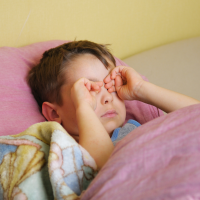My Child My Family
Our Services


Managing Their Emotions
My Child My Family’s first service is to help kids manage their emotions begins by validating those emotions and providing an environment in which they feel safe to express them. As several studies have shown, kids who feel safe are more likely to develop and use appropriate emotion regulation skills to deal with difficult feelings.
Emotion regulation is not just about expressing emotions in a socially appropriate manner. It is a three-phase process that involves teaching children to identify emotions, helping them identify what triggers those emotions, and teaching them to manage those emotions by themselves. When we teach kids that their emotions are valid, we help them view what they feel as normal and manageable.


Understanding Difficult Behaviors
Trauma is not well understood by society which leads to miscommunication, misunderstandings, and sometimes further trauma. Many of these same people believe that trauma does not have to define or continue to affect you. While this is a positive and sometimes balanced view, trauma is something that leaves many fingerprints that cannot be so easily erased.
Many people assume that trauma is a bad experience that can be overcome with the “right combination” of things (i.e., social support system, medication or illegal use of drugs or alcohol, overindulgence in pleasurable activities or work, months or years of therapy, denial, avoidance, etc). But the reality is that trauma is way more complicated than we care to admit and sometimes more complicated to treat than we think.


Providing Parenting Strategies and Support
When it comes to family life, everyone strives to figure out how the relationship between parents and children can become ideal. Positive parenting techniques work well for raising children with discipline and good moral values, and are every parents’ dream. However, it is not an easy feat. And it is important to know that the parent child relationship is a two-way street, in other words, it is actually a partnership between a parent and their child.


Sleeping Difficulties
Many of us experience trouble sleeping at one time or another. Usually it’s due to stress, travel, illness, or other temporary interruptions to your normal routine. But if sleep problems are a regular occurrence and interfere with your daily life, you may be suffering from a sleep disorder. Frequently having trouble sleeping can be a frustrating and debilitating experience. You sleep badly at night, which leaves you feeling dead-tired in the morning and whatever energy you have quickly drains throughout the day.


Autism, ADHD, and other forms of Neurodivergence
There is as much diversity in human brains as there is diversity in the way humans look, and this is a good thing! Neurodiversity is as beneficial to society as biodiversity is to a rainforest. Unfortunately, people with less common brain types can face greater challenges in our world than people with the most common brain type (neurotypical brains). Our therapists work with clients with many different neurotypes, including autistic and ADHD clients, to help them create lives that work for them.


Other Things That Impact On Your Daily Life Such As Anxiety & Depression
Generalized Anxiety Disorder (GAD) is characterized by persistent and excessive worry about a number of different things. People with GAD may anticipate disaster and may be overly concerned about money, health, family, work, or other issues. Individuals with GAD find it difficult to control their worry.


Trauma
Trauma is not well understood by society which leads to miscommunication, misunderstandings, and sometimes further trauma. Many of these same people believe that trauma does not have to define or continue to affect you. While this is a positive and sometimes balanced view, trauma is something that leaves many fingerprints that cannot be so easily erased.
Many people assume that trauma is a bad experience that can be overcome with the “right combination” of things (i.e., social support system, medication or illegal use of drugs or alcohol, overindulgence in pleasurable activities or work, months or years of therapy, denial, avoidance, etc). But the reality is that trauma is way more complicated than we care to admit and sometimes more complicated to treat than we think.


Parental Separation
Emotional and behavioral problems in children are more common when their parents are fighting or separating. Children can become very insecure. Insecurity can cause children to behave like they are much younger and therefore bed wetting, ‘clinginess’, nightmares, worries or disobedience can all occur. This behavior often happens before or after visits to the parent who is living apart from the family.
These feelings are often made worse by the fact that many children have to move home and sometimes school when parents separate, and most families in this situation come under some financial strain, even if they did not have money worries before. Even if the parental relationship had been very tense or violent, children may still have mixed feelings about the separation. Many children hold onto a wish that their parents may get back together.
FAQ
Do I need a Referral?
No. You can self-refer direct to us. (Sometimes a referral is needed to assist in reducing fees or to meet private health requirements).
What is a MHCP?
(Mental Health Care Plan) Its a special plan developed by your Doctor to allow a rebate from Medicare, if the clinician you see is registered with Medicare.
How much does it cost?
The fees will vary depending on who you see on our team. Sometimes you can get a refund back from your private health insurance or a rebate back from Medicare.
What's my first step?
You need to speak to our Manager about your circumstances so we can decide who in our team might be best for your situation.
Why do I need a Parent Consultation?
This allows us to obtain specific information from you, about your child + your family. It is an adult only session as we don’t discuss parent concerns in front of the child.
How many sessions will my child need?
That’s difficult to know as every child is different and every situation has different goals and plans.
How often does my child have sessions?
Some children attend weekly or every 2 – 3weeks. This depends on the child’s situation, age, and treatment plan.
My Child My Family
Walk-Ins Are Welcome
Contact Number
08 9791 9955
Our Services
About Us
Key Techniques
Events
Contact Us








